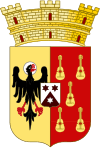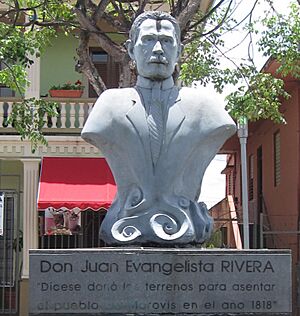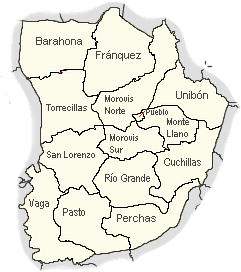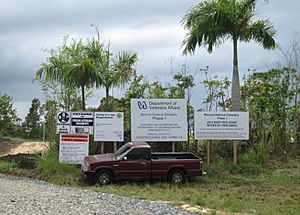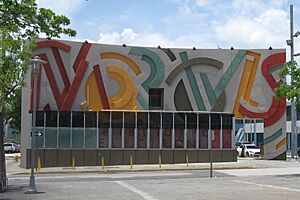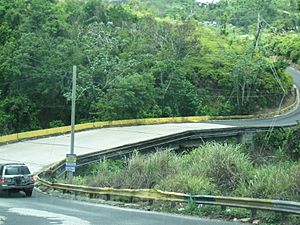Morovis, Puerto Rico facts for kids
Quick facts for kids
Morovis
Municipio Autónomo de Morovis
|
|||
|---|---|---|---|
|
Town and Municipality
|
|||
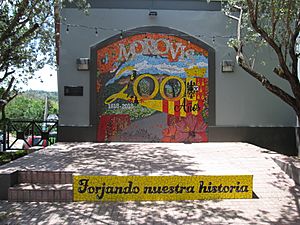
A small plaza in Morovis barrio-pueblo
|
|||
|
|||
| Nickname(s):
"La Isla Menos Morovis" ("The island but Morovis")
|
|||
| Anthem: "Oh Morovis, tu vives latente" | |||

Map of Puerto Rico highlighting Morovis Municipality
|
|||
| Sovereign state | |||
| Commonwealth | |||
| Settled | 1815 | ||
| Founded | January 24, 1818 | ||
| Founded by | Don Juan José de la Torre | ||
| Barrios | |||
| Area | |||
| • Total | 38.7 sq mi (100.3 km2) | ||
| Elevation | 1,230 ft (375 m) | ||
| Population
(2020)
|
|||
| • Total | 28,727 | ||
| • Rank | 43rd in Puerto Rico | ||
| • Density | 741.8/sq mi (286.41/km2) | ||
| Demonym(s) | Moroveños | ||
| Time zone | UTC−4 (AST) | ||
| ZIP Code |
00687
|
||
| Area code(s) | 787/939 | ||
| Major routes | |||
Morovis is a town and municipality in Puerto Rico. It is located in the central part of the island. Morovis is north of Orocovis and south of Manatí, Vega Baja, and Vega Alta. It is also east of Ciales and west of Corozal.
The town is divided into 13 areas called barrios, plus the downtown area known as Morovis Pueblo. Morovis is part of the larger San Juan-Caguas-Guaynabo Metropolitan Statistical Area.
Contents
History of Morovis
Morovis has a rich history, starting with its official founding in the early 1800s.
How Morovis Was Founded
In 1815, a group of people led by Don Juan José de la Torre wanted Morovis to become its own town. Before this, it was part of Manatí. The government of Puerto Rico agreed to the separation in 1817.
However, Morovis had to meet certain requirements first. It needed to have at least a thousand residents. It also had to build a church and other public buildings. By 1818, these goals were met, and Morovis was officially founded.
The town hall was built in 1822. A new church was finished in 1823. This church was dedicated to Nuestra Señora del Carmen. The land for the church was given by Don Juan Evangelista Rivera. Don Juan José de la Torre was the first mayor. Don Juan Evangelista Rivera became the second mayor.
The Famous Nickname: "The Island But Morovis"
Morovis has a special nickname: "La Isla Menos Morovis" (which means "The island but Morovis"). This name came about in 1853. At that time, a serious sickness called cholera spread across Puerto Rico. Morovis was the only municipality that did not get sick.
People outside of Morovis sometimes thought this phrase was negative. But for the people of Morovis, called moroveños, it is a positive motto. It reminds them of a time their town was uniquely safe.
Morovis in the 20th Century
After the Spanish–American War, Spain gave Puerto Rico to the United States in 1898. Puerto Rico then became a U.S. territory. In 1899, a census showed that Morovis had a population of 11,309 people.
Hurricane Maria's Impact on Morovis
Morovis is a mountainous area, about 100.3 square kilometers (38.7 square miles) in size. On September 20, 2017, Hurricane Maria hit Puerto Rico very hard. Morovis was especially affected.
Many homes were damaged or destroyed. Between 1,500 and 2,000 homes lost their roofs. About 500 wooden homes were completely ruined. Roads and bridges were also damaged by landslides and floods. For many months, residents had no electricity, phone service, or basic supplies.
The community of San Lorenzo, a barrio in Morovis, was cut off. Its bridge over the Morovis River was washed away. The mayor at the time, Carmen Maldonado, worked hard to help. She delivered food to residents. The town hall became a food distribution center. She also bought a water truck to bring clean water to people.
Mayor Maldonado asked the governor of New York for help. A group called H.e.a.r.t. 9/11 came to Morovis. These volunteers, many of them carpenters, helped repair and rebuild homes. They continued rebuilding roofs into late 2019.
Geography of Morovis
Morovis is divided into smaller areas called barrios.
What Are Barrios?
Like all towns in Puerto Rico, Morovis is split into sections called barrios. The main town buildings, central square, and large Catholic church are in a small barrio called "Pueblo."
Here are the 14 barrios of Morovis:
- Barahona
- Cuchillas
- Fránquez
- Monte Llano
- Morovis barrio-pueblo
- Morovis Norte
- Morovis Sud
- Pasto
- Perchas
- Río Grande
- San Lorenzo
- Torrecillas
- Unibón
- Vaga
Special Communities in Morovis
Some areas in Puerto Rico are called "Special Communities." These are places where people face challenges and need extra support. In Morovis, several barrios, communities, or neighborhoods are on this list. These include parts of Barrio Vaga, Santo Domingo-Pellejas, and Parcelas Cuchillas. Other areas are Comunidad José Otero Claverol, Parcelas San Lorenzo, and Parcelas Torrecillas. Also on the list are Patrón, Sector Invasiones de Torrecillas, Sector Jobos, Sector Riachuelo, Sector Rosado, Barrio Unibón, Sector Vietnam, and Villa Roca.
Morovis National Veterans Cemetery
The Morovis National Cemetery is a special place for U.S. military veterans. It was built in Morovis on a large piece of land. This cemetery was created because the older Puerto Rico National Cemetery in Bayamón was full. Construction began in 2019, and burials were planned to start in 2021.
Economy and Energy in Morovis
Morovis is working with other towns to improve its energy supply.
Working Together for Energy
In 2019, the mayors of Villalba, Orocovis, Morovis, Ciales, and Barranquitas signed an agreement. They formed an Energy Consortium. This group is the first of its kind in Puerto Rico. Its goal is to create strong and efficient energy networks for their communities. They also want to have backup power systems. This plan is important for preparing for future hurricanes, especially after Hurricane Maria hit these towns hard in 2017.
Tourism in Morovis
Morovis has interesting places to visit and unique local businesses.
Landmarks and Places to See
One famous landmark in Morovis is The Red Bridge (Puente Colorao). This iron bridge was built in 1912. You can find it on PR-155 in the barrio of Morovis Norte.
The Cuevas Las Cabachuelas (Cabachuelas Caves) are a system of caves that opened for tours in 2019. They are located between Morovis and Ciales, Puerto Rico. These caves are part of the Cabachuelas Natural Reserve, which is important for its culture, history, and natural features. You can take guided tours by reserving through the Diógenes Colón Gómez Cultural Center in Morovis.
La Patria Bakery is a very old bakery, started in 1862. It is famous for its Pan de La Patita Echa' bread. This bread is made in a brick oven and has a unique shape that looks like crossed legs.
The Julia M. Cheverez Electronic Library is located in the main square of Morovis barrio-pueblo.
Local artists and a group called ValorArte painted murals in each barrio. These murals show important values like honor, peace, and leadership.
German Cuisine in Morovis
Casa Bavaria is a German restaurant located in the central mountains of Morovis. It has become a popular meeting spot for the German community in Puerto Rico. Even former President Bill Clinton visited it in 2009!
Culture and Events in Morovis
Morovis celebrates its traditions with various festivals throughout the year.
Festivals and Events
Morovis holds its main festival, the Fiestas Patronales de Nuestra Señora del Carmen, in July. This festival honors Our Lady of Mount Carmel, the town's patron saint. It is a religious and cultural event with parades, games, local crafts, rides, food, and live music.
Other fun events in Morovis include:
- Tribute to Don Felo - May
- Maratón del jíbaro (The Peasant's Marathon) - June
- Cuatro Festival - July
- The Island Except Morovis - December
- Innocents' Day - December
Population of Morovis
Morovis has seen its population change over the years.
| Historical population | |||
|---|---|---|---|
| Census | Pop. | %± | |
| 1900 | 11,309 | — | |
| 1910 | 12,446 | 10.1% | |
| 1920 | 14,660 | 17.8% | |
| 1930 | 17,332 | 18.2% | |
| 1940 | 19,167 | 10.6% | |
| 1950 | 19,291 | 0.6% | |
| 1960 | 18,094 | −6.2% | |
| 1970 | 19,059 | 5.3% | |
| 1980 | 21,142 | 10.9% | |
| 1990 | 25,288 | 19.6% | |
| 2000 | 29,965 | 18.5% | |
| 2010 | 32,610 | 8.8% | |
| 2020 | 28,727 | −11.9% | |
| U.S. Decennial Census 1899 (shown as 1900) 1910-1930 1930-1950 1960-2000 2010 2020 |
|||
Population by Race (2000 Census)
The 2000 Census showed the racial makeup of Morovis:
| Race - Morovis, Puerto Rico - 2000 Census | ||
|---|---|---|
| Race | Population | % of Total |
| White | 27,917 | 93.2% |
| Black/African American | 894 | 3.0% |
| American Indian and Alaska Native | 61 | 0.2% |
| Asian | 21 | 0.1% |
| Native Hawaiian/Pacific Islander | 0 | 0% |
| Some other race | 643 | 2.1% |
| Two or more races | 422 | 1.4% |
Transportation in Morovis
Morovis has several important roads and bridges that connect its communities.
There are 15 bridges in Morovis. Key roads that pass through Morovis include PR-137, PR-145, PR-155, PR-159, and PR-160.
Symbols of Morovis
Morovis has its own official flag and coat of arms, each with special meanings.
The Flag of Morovis
The flag of Morovis is split into two equal vertical parts. The part closest to the flagpole is yellow. On this yellow part, there is an eagle from the coat of arms. The eagle's head faces left, towards the flagpole. The other half of the flag has seven vertical stripes of equal width. Four of these stripes are red, and three are yellow, alternating with each other.
The Coat of Arms of Morovis
The coat of arms of Morovis has several symbols. On the left side, there is an eagle. This eagle represents Saint John the Evangelist. It also honors the town's founder, Don Juan Evangelista Rivera.
On the right side, there are five cuatros. A cuatro is a special Puerto Rican musical instrument. These five cuatros show that Morovis is a main center for making these instruments.
In the middle of the shield, there is a symbol for the Order of the Carmelite Nuns. This also represents Our Lady of the Carmen, who is the patron saint of the town. The left half of the shield is yellow. On this yellow part, there is a black eagle with a red beak and claws. Its head has a halo around it.
Notable People from Morovis
- Wesley Correa, a basketball player who played for the local team for 16 years.
- Iluminado Davila Medina, a talented cuatro musician.
- Julio Negrón Rivera, a master craftsman who makes the Puerto Rican cuatro, a traditional musical instrument.
Images for kids
See also
 In Spanish: Morovis para niños
In Spanish: Morovis para niños



